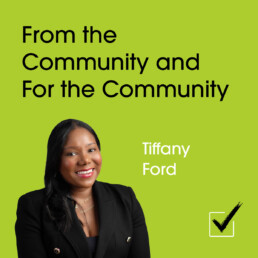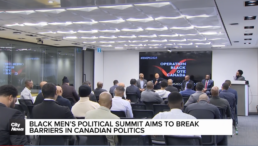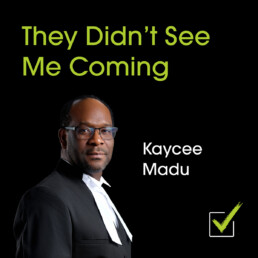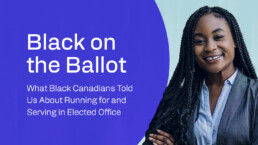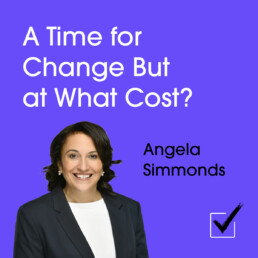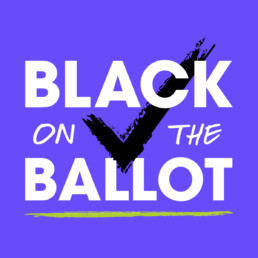Black Canadians in Politics: Carleton Research Project Explores Ways to Enhance Inclusion
In 1859, American-born shoemaker and abolitionist Abraham Doras Shadd became the first Black man to hold public office in Canada when he was elected as a councillor in southwestern Ontario.
More than a century later, in 1972, social worker Rosemary Brown became the first Black woman elected to a provincial legislature, serving as an MLA in British Columbia. Three years later, she ran for the NDP’s leadership, finishing a close second to Ed Broadbent.
By Dan Rubinstein | Carleton University
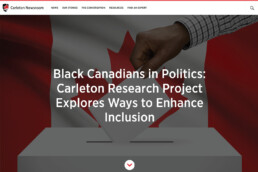
From the Community and For the Community
Tiffany Ford entered politics to make change in her own neighbourhood. Tired of the way local politicians and the media depicted the community of Jane and Finch, she began knocking on doors to become a school board trustee. Can you do politics without parties? What does political success look like if you don’t want to pick a team? And how do you stand up for your community in the face of overt racism?
This episode features:
Tiffany Ford
Toronto School Board Trustee (2014-2018) and candidate for City Council (2018)
Jean Augustine
Member of Parliament (1993-2006) and Minister of State (2002-2004)
Zanana Akande
Member of Ontario’s Provincial Parliament (1990-1994) and Minister of Community and Social Services (1990-1991)
This episode includes audio clips from Rebel Media.
Resources for this episode:
Read the research that supports this podcast:
New report on being Black in Canadian politics
On Black Canadians’ political participation:
Social, political and economic participation, by race
On diversity on municipal councils in Canada:
Resources for running:
OBVC’s “A Seat at the Table” toolkit
To support the important work being done by Operation Black Vote Canada, consider making a donation.
Political parties should commit to having a certain number of black candidates
“Political parties should commit to running a certain number of Black candidates. Every political party should have a mandate to nominate a certain number of Black candidates, and they can choose the ridings in which that would happen,” said Jordan Gray, a former Mississauga city council candidate, in an interview.
Mr. Gray made the remarks in an interview Saturday at a summit on black men’s political participation in Toronto.
“The political system wasn’t designed with us in mind,” says Velma Morgan, president of Operation Black Vote Canada. “It was created for white, middle-class men, so anyone else has to try to fit in.”
By Rozenn Nicolle and Sarah Tomlinson | ICI Toronto, Radio Canada
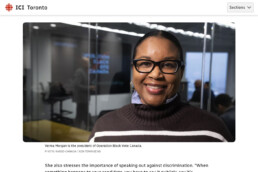
Black on the Ballot profiled on City News as part of their coverage of the Black Men’s Political Summit
Black on the Ballot profiled on City News as part of their coverage of the Black Men’s Political Summit.
January 25, 2025
Black Canadians’ stories of political life recorded in new study and podcast
On the eve of Black History Month, a new research project and accompanying podcast are shining a light on the experiences of Black Canadians who’ve run for public office.
By Christina Leadlay | The Hill Times
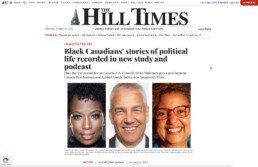
They Didn't See Me Coming
To tell the story of his journey into politics, Kaycee Madu starts at the beginning, with his childhood in Nigeria and arrival in Canada. When he joined the United Conservative Party in Alberta, he had plans. But they were waylaid by one phone call. Listen in on his candid conversation with host Nana aba Duncan where she asks: How does a life story shape one’s approach to politics? What role do the media play in the making and unmaking of a political career? And what are the risks and rewards of being the voice of your community?
This episode features:
Kaycee Madu
Member of the Legislative Assembly of Alberta (2019-2023) and former Cabinet Minister
Velma Morgan
Chair, Operation Black Vote Canada
This episode includes audio clips from CTV News and CBC News.
Resources for this episode:
Read the research that supports this podcast:
New report on being Black in Canadian politics
On Black Canadians’ interactions with police:
Summary of research on anti-Black racism in Canada’s criminal justice system
On the role of the media:
Framed: Media and the Coverage of Race in Canadian Politics
To support the important work being done by Operation Black Vote Canada, consider making a donation.
Groundbreaking new research and podcast provide a first-hand account of Black Canadians’ experiences in politics
(Ottawa, ON – January 16th, 2025) Black Canadians have been running for and serving in elected office for more than 150 years, but most of us know nearly nothing about their experiences. Since 2022, researchers at Carleton University have been working with Operation Black Vote Canada to change that.
Through comprehensive new research and an original four-episode podcast, Black on the Ballot documents what it’s really like to be a Black politician in Canada. We asked them what motivated them to run for office, where they found support (and discouragement), what role identity played in their political experience, and what the future holds. Key findings include:
- Most Black Canadians enter politics at the local level.
- There is little evidence of a gender gap in Black Canadian candidacy: Black women and Black men are almost equally likely to seek elected office. However, Black women are less likely than Black men to consider running for office unless someone has suggested that they do so.
- Most Black Canadians in politics are first- or second-generation Canadians. They tend to enter politics from careers in business, government and politics, and law.
- A lack of financial resources and a shortage of volunteers are key barriers to political success. In addition, a majority of Black Canadian politicians report experiencing discrimination while running for or serving in office, including from members of the public, other politicians, legislative and municipal staff, and in the media.
- Even so, a wide majority of Black Canadians say they would run for office again.
The research is based on the first-ever national survey of Black Canadians in politics as well as more than 30 in-depth interviews with Black Canadian candidates and officeholders from all across the country. The podcast weaves these data together with first-person accounts from Black politicians who reveal the good, the bad, and the ugly. Hosted by award-winning journalist and Carleton University professor Nana aba Duncan, the podcast features:
- Angela Simmonds, Nova Scotia’s first Black Deputy Speaker;
- Kaycee Madu, the country’s first Black Minister of Justice;
- Tiffany Ford, former Toronto District School Board Trustee and City Council candidate;
- Balarama Holness, former mayoral candidate for Montreal.
Listeners will also hear from Jean Augustine, Canada’s first Black woman Member of Parliament, and Zanana Akande, the first Black woman to serve as a cabinet minister in Canada.
Episodes are available wherever you get your podcasts. New episodes come out every Wednesday.
For episode links and a copy of the research report, visit blackcanadianpolitics.ca.
Quotes
“For 20 years, Operation Black Vote Canada has worked to increase the number of Black Canadians in public office. The research in this report is not just a retrospective of the road we have travelled but a forward-looking reflection on the work that still needs to be done. Over the last 20 years, Black Canadians have made strides in political engagement but have also faced considerable barriers. Even so, very little research has looked comprehensively at their experiences in politics. This project is both a celebration of our progress and a call to action for further change.”
– Velma Morgan, project co-director and Chair, Operation Black Vote Canada
“Although Black Canadians have been participating in politics since before Confederation, we have done little to excavate and archive their stories. This project provides a corrective, offering a comprehensive portrait of the Black experience in politics: the trials, the triumphs, the unfinished business. It is long overdue. Its recommendations provide a roadmap to communities, political parties, and institutions wishing to increase diversity and inclusion in Canadian politics. With a federal election on the horizon, this is more important than ever.”
– Erin Tolley, project co-director and Canada Research Chair in Gender, Race, and Inclusive Politics, Carleton University
About Operation Black Vote Canada:
Operation Black Vote Canada (OBVC) is a national, non-profit, multi-partisan organization dedicated to promoting the political participation and empowerment of Black Canadians. Its mission is to engage, educate, and inspire Black Canadians to actively participate in the political process, with a focus on voting, running for office, and overall civic involvement. To find out more, visit obvc.ca
For interviews, please contact:
Velma Morgan
Chair, Operation Black Vote Canada
chair@obvc.ca
Erin Tolley, PhD
Canada Research Chair and Associate Professor, Carleton University
erin.tolley@carleton.ca
“Although Black Canadians have been participating in politics since before Confederation, we have done little to excavate and archive their stories.”
– Erin Tolley, project co-director and Canada Research Chair in Gender, Race, and Inclusive Politics, Carleton University
A Time for Change, But at What Cost?
Angela Simmonds made history as the first Black deputy speaker in Nova Scotia’s House of Assembly. But after just two years in elected office and a run at her party’s leadership, she resigned. Why? What challenges did she face during her time in politics? What is she most proud of? And what are the hidden pitfalls of entering the political arena?
This episode features:
Angela Simmonds
Deputy Speaker and Member of the Nova Scotia House of Assembly (2021-2023)
Wisdom Tettey
Political scientist and President of Carleton University
Erin Tolley
Political scientist and Canada Research Chair in Gender, Race & Inclusive Politics at Carleton University
This episode includes audio clips from CTV News Atlantic.
Resources for this episode:
Read the research that supports this podcast:
Report on being Black in Canadian politics
Election rules in Nova Scotia:
On the link between money and politics in Canada:
Gender and donations in Canadian politics
Ethnicity and donations in Canadian politics
On the politics of appearance:
Hair, skin and Black women political elites
To support the important work being done by Operation Black Vote Canada, consider making a donation.
Senator Bernard’s push to highlight the Upper Chamber’s lack of Black men
Only three Black men have been appointed to the Senate in its history, and there have been none in the Chamber since Don Meredith’s resignation in 2017.
By Laura Ryckewaert | The Hill Times

